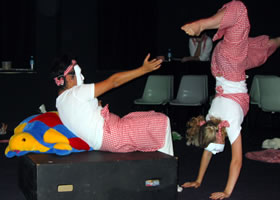Practice vs Theory

What is the connection between practical tutorials and theory?
Ever since Aristotle identified ‘dramas’ as forms of poetry that were ‘acted’ at least two components have been recognised in the creation of dramas. The first component is the creation of a text (usually a literary text) while the second component can be identified as the actions used to perform that text for an audience. Both components are related and require intellectual and creative activity. However, a performance requires additional skills that are best developed through practical exercises.
Practical tutorials are designed to help you identify and practice a variety of skills that will help you analyse what is on a ‘page’ and transform that information into activity on a ‘stage.’ The practical skills you will be taught include some training in performance and production techniques but activities will focus primarily on developing your ability to imagine and construct ‘possible’ meanings onstage. This ability is extremely important to develop because texts and actions can be analysed and performed in many different ways. Since there are many different ways of analysing texts and performing actions, you need to learn how to construct actions and meanings that can be clearly identified by various audiences.
While there are no hard and fast rules for devising or interpreting dramatic or theatrical performances, practical tutorials provide students with opportunities to practice using a variety of critical and creative tools. Experimenting with such tools helps you understand how different theories, knowledge, aptitudes and skills can be used in the analysis and production of drama, theatre and performance. To help you get the most out of your practical tutorials, here are some answers to some common questions about how different information can influence your activities:
Why is it important to learn many different theories when studying drama?
‘Theory’ and ‘theatre’ are words that have a related etymology:
Theatre is a word that has evolved from the Greek word theatron meaning a ‘place for viewing.’
Theory is a word that has evolved from the Greek word theorein meaning ‘to gaze upon.’
The Greek roots of both these words suggest connections to the act of ‘seeing.’ While theatres might be recognised as places where dramatic events can be seen, theories can be recognised as descriptions or explanations of how and why people see what they see. As human beings can view things, people, periods and places differently depending on their position in space or history as well as their social or ideological positions, theories offer ways to explain different perspectives. Theories also draw our attention to views we may not have recognised. While different perspectives can be useful, you may also be asked to consider whether some theories offer views that are more or less useful about the events, audiences or texts being studied. As you will be studying texts and performances from a range of eras, you might also need to consider why theories that were useful in one era might be rejected as misinformation or even nonsense in another era. Just a few major theories you are likely to consider in tutorials are:
Literary theories: these theories suggest different ways to analyse and interpret literary texts eg. Feminist theory, Postcolonial theory or New Criticism
Acting theories: these theories describe different ways for actors to perform for an audience eg. See theories by Stanislavski or Suzuki.
Drama theories: these theories suggest different ways to identify dramas eg. See the theories produced by Aristotle or Diderot
Theatre theories: these theories suggest different ways to identify what is theatrical eg. See theories being produced in the field of Theatre Studies, such as Semiotics.
Performance theories: these theories suggest different ways to identify a performance eg. See theories being produced in the field of Performance Studies, such as the work of Richard Schechner.
Further reading:
Theory
Auslander, Philip. Liveness: Performance in a Mediatised Culture. New York; London: Routledge, 1999.
Barish, Jonas. The Anti-Theatrical Prejudice. Berkeley: U of California P, 1981.
Butler, Judith. Bodies That Matter. New York; London: Routledge, 1993.
Gerould, Daniel. Theatre, Theory, Theatre: The Major Critical Texts from Aristotle and Zeami to Soyinka and Havel. New York: Applause, 2000.
Pavis, Patrice, ed. The Intercultural Performance Reader. New York; London: Routledge, 1996.
Schechner, Richard. Performance Studies: An Introduction. New York; London: Routledge, 2002.

